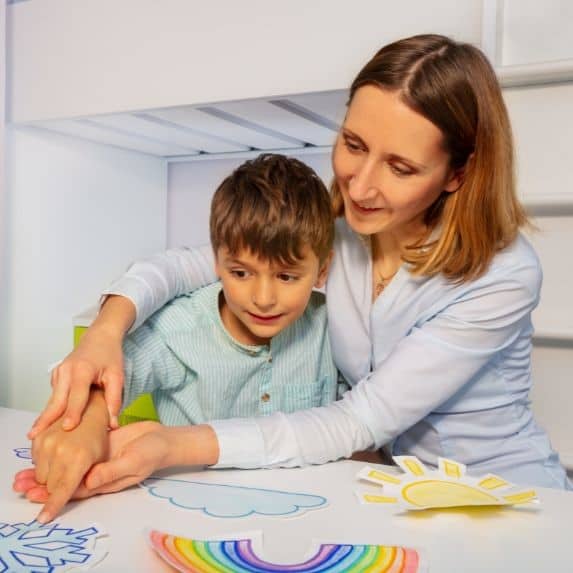How to Build Self-Confidence in Kids with Autism
Children with autism view the world uniquely, and learning how to navigate it confidently can feel intimidating or confusing to them. This is especially true for children with autism spectrum disorder. Feeling that you don’t fit in, no body understands you, and you can’t navigate the world easily can lead to very low self-esteem and poor mental health. Here are tips for increasing healthy self-esteem in autistic children.

Increasing Self-Esteem in Autistic Children
Don’t Try to Learn New Skills
This may seem odd not to encourage learning new skills, but when the world is coming at you at such a fast pace, trying to learn new things can send your child until overwhelmed. Autistic people struggle with regulation and dealing with too many things simultaneously. Instead of always trying new therapies and new skills, take a calm and gentle approach. Work on life skills that are must-dos. Tying shoes is not a must-do unless they want it to be. Your child can wear shoes that slip on, and even sneakers and tennis shoes come in awesome styles that are slip-on without anyone knowing it.
Social skills are also not a must-do unless they are necessary for safety reasons. Shaking hands and “looking people in the eye” should be shelved until your child feels safe and confident around family members and close friends. Then, and only then, should those skills be attempted.
Focus on Their Strengths
One essential tip for boosting your child’s self-esteem is to focus on their strengths. Every child has notable strengths, such as kindness and attention to detail. In fact, my child’s superpower is kindness. He is never mean to anyone, ever.
Spending time nurturing and building their strengths further creates an established foundation where they can feel confident. As you continue to focus on your child’s strengths, the more their confidence and self-esteem will grow. Reward their strengths by gifting them stuffed animals to play with. Stuffed animals can teach children how to explore their imaginations, which can further boost their self-esteem.
Help Them Build a Collection
Another way of increasing self-esteem in autistic children is by helping them build a collection. If your child loves stuffed animals, build that collection of stuffed animals with them. Get involved in what sparks their interest. However, your child’s interests might be something else. Find the items or interests and nurture those things. If they love rocks, get books about rock collecting. When your child sees you take an interest in the things that they like, it will help build your child’s confidence.
Nurture Their Talents and Interests
Every child has something they’re good at or love to delve into. For instance, perhaps your child loves history, or maybe they adore art and enjoy drawing or painting. One tip for building healthy self-esteem in autistic children is to allow them to spend time understanding and growing their passions.
Reinforcing something your child loves or is particularly good at can improve their self-esteem and make them feel more confident. It could be anything from reading, writing, hiking, and climbing. As long as your child feels supported in their hobbies, they can feel successful.
Study Your Child and Their Behaviors
Maybe you are unsure of what your child is interested in. A great way to learn their interests is to study their behaviors. When are they happiest? Explore different settings and see how they react. Too many parents avoid situations because they are sure their child will react negatively in certain social situations or social interactions. Because your child hates going to the park, you assume your child will hate Walt Disney World.
However, Disney World may be the one thing that they love. If you avoid all unknown situations and only keep your child in their comfort zone, you will never know how they will respond.
Use Positive Reinforcement
Positive reinforcement is a significant motivator in children and adults. When your child practices good habits, manners, or understanding, praising them for their efforts and success can improve their confidence.
For instance, if your child did a good job finishing their homework without needing help or guidance, praise them by expressing how good it must feel to put the work behind them. This can boost their self-esteem and remind them that they can do whatever they put their mind to. You can help your kid achieve their goals by reminding them how good it feels to overcome everyday hurdles.
Bad Days Can Happen
Sometimes, bad days can occur. That’s normal. However, it’s important to remind yourself and your child that bad days will always pass, and the following day is a great opportunity to start over.
Emotional outbursts, meltdowns, frustrations, overwhelming feelings, and other everyday hurdles can leave everyone feeling exhausted and stressed. Reminding each other of forgiveness and that bad days will pass can help them learn to navigate life confidently in the future. Bad days don’t have to push them down.
Use Videos to Prepare Your Child
I hear the term “social stories” all the time. However, I never used social stories. Instead, I would use real videos of the events or places we were going, especially if it were a first time event. Social your child a video of what will happen is a great way to prepare them for difficulty. While I am not totally against a social story, I know that in my own life, I have a greater time navigating a place if I have had a video to watch beforehand.
The really good news is that there are videos for almost everything that your child may have a hard time with. I have a great video on going to the dentist. We also have some videos on different rides and attractions at Disney. Follow along on my Facebook page to watch my son navigate dinner out, buttering his bread and trying new foods. Many parents have said watching Jack-Jack is a good way for their child to see another child with autism model everyday skills.
Remember Your Own Experiences
Sometimes, as parents, we forget what life was like as a young child or a teen. We forget how scary things seemed and how unexpected situations could throw us into a tizzy of our own. We also forget what it is like to be a child standing in the checkout line in a sea of legs. If you put yourself into your special needs child’s place, it will help you understand what is going on better.
Get down on their level.
Look at the world through their eyes.
See how confusing and scary it is to be three feet tall.
Try New Things When they are Secure and Feeling Safe
From art classes to drama classes, new experiences can help build confidence, but only when your child is secure and confident. All people have good and bad days, but trying new things on a bad day will not help low self-confidence. If you are going to try a new restaurant, young children will do best when
Find a Community
Finding a community doesn’t necessarily mean an autism community. However, finding groups or individuals that you and your child can connect with will help in building confidence for you (as the parent of an autistic child) and your child.
What types of community can you be a part of?
Churches – pay special attention to how a church treats all people. There are visual cues to see if a church will be open and welcoming. Do they have “quiet” signs everywhere. Are children encouraged to be in “children’s church?”
Groups – 4-H, Boy Scouts, Girl Scouts, or other youth organizations already helping young people gain confidence may be where your child can find group activities.
Sports – Physical activities are necessary for all growing children. There are leagues dedicated to special needs children. However, depending on your child’s level, you may find a local soccer league that has both neurotypical peers and special needs peer group. If the league encourages children of all abilities there will be a greater acceptance for your child.
Model Positive Self-Esteem
When you have a child with autism who regularly feels down on themselves, helping your child set goals for themselves and following through can help them build their confidence. Teach them that failure is a part of learning and doesn’t detract from who they are.
Modeling self-confidence, in turn, causes them to reflect similar behavior. Children enjoy mimicking others who they trust and following their examples, so practicing good behavior and emotional control provides them with learning tools they’ll use well into adulthood.
I hope that these tips help you on the road to increasing self-esteem in your autistic child.
The Best Homeschooling Tips for a Child with Autism

Reviewing movies for parents from a Christian perspective since 2005. Know Before You Go!
Christian Homeschooling mom – 30 years and counting
Autism Mom & Disney enthusiast

